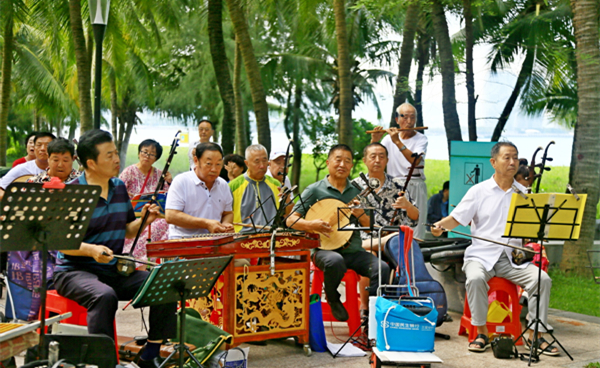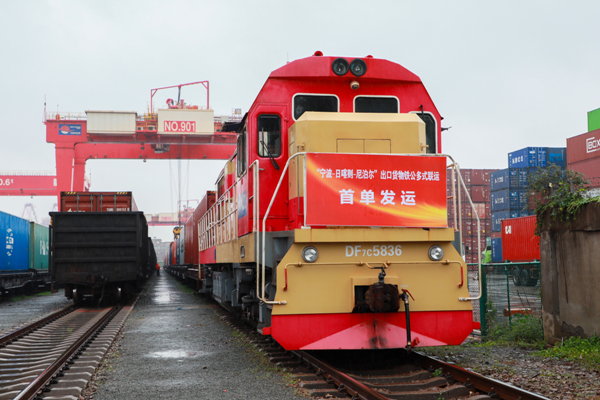Remote work boosts off-peak domestic travel

People traveling south for warmer weather hold a concert in Sanya, Hainan province, in October 2023. CHINA DAILY
Dropping temperatures in a large part of North China have led to more people traveling south for warmer weather. Besides seniors, more young consumers have also opted to travel south during the off-peak season and are visiting more niche destinations this winter.
Compared to last year, airfares and hotel prices are relatively cheaper, driving more people to take trips. This winter, the number of bookings for hotels in southern China with stays of more than one month in length has doubled year-on-year, according to Qunar, a Beijing-based online travel agency.
More young people are taking advantage of flexible remote working options to experience something new and travel. Between November and January, the number of domestic hotel bookings with stays of over a month grew the fastest among travelers aged between 25 and 30, and the figure jumped 2.5-fold compared to the pre-pandemic level of 2019.
Zhu Xiaoqing, an office employee in Beijing, said her company allows staff members to take two months for flexible remote work. She recently booked a serviced apartment in Lingshui, in the tropical island of Hainan province, and she plans to stay there for a month this winter.
"Elderly people who live in northern regions like to go to warmer places for winter every year, and then return to the north after the weather warms up," said Cai Muzi, a Qunar researcher. "In the past few years, the work and lifestyles of many have changed, and flexible working has become a popular choice for young people. Some companies also offer employees more flexibility."
She added that at an age between 25 and 30, many people have been working for a few years, are economically well off and don't have children to take care of yet. Being able to work in warmer places and getting away from harsh winter weather could significantly enhance one's sense of happiness.
Besides traditional winter vacation destinations such as Sanya and Haikou in Hainan, young people have been willing to explore small towns and counties with fewer people, beautiful sceneries, suitable temperatures and higher cost-effectiveness.
Counties in the south such as Yunnan province, Guangxi Zhuang autonomous region, Fujian province and Hainan are more popular, with bookings for long-term hotel stays of more than one month increasing threefold year-on-year, Qunar found.
Despite the rapidly growing number of young flexible remote workers heading to warmer climes, elderly travelers still constitute the majority of off-peak travelers. After the National Day holiday break, the proportion of seniors who traveled has been increasing.
In the first week after the weeklong break, when prices of flights and hotels declined, elderly travelers began to embark on their trips. Bookings of travel products made by consumers aged 50 and above in that week nearly tripled over the number made during the holiday, according to Trip.com Group, China's largest online travel agency.
When strong cold air hits northern China, domestic cities in southern China see their booking volumes of travel products jump significantly. Besides major destinations, some smaller places such as Tengchong, Jinghong, Mangshi and Mile of Yunnan, have become new favorites of the elderly, Trip.com found.
For example, travel product bookings to Mile this winter have surged 160 percent over last winter. Hotel prices in Mile are about 40 percent lower than those of Dali and 60 percent lower than those in Sanya, according to Trip.com.
For top sources of travelers, residents who prefer to escape the cold include those who come from Beijing; Shenyang, Liaoning province; Xi'an, Shaanxi province; and Qingdao, Shandong province, the online travel agency found.
Besides hotels, more travelers have been choosing long-term rentals, apartments and homestays.
This winter, the supply of hotel rooms has significantly increased, and the average price has declined. For bookings between November and January, the average monthly rent of a long-term stay is less than 2,700 yuan ($377), according to Qunar.
"In the first three quarters, the occupancy rates of some hotels were not ideal, and some serviced apartments and homestays began to target long-term rental business, launching more affordable room types, while providing services such as group meals, meal delivery, laundry and transportation for long-term rental travelers," Cai said.
She added that compared with ordinary residential places, serviced apartments and homestays are often equipped with better decorations, more complete services and similar prices, making them highly competitive.
Tongcheng Travel, a Jiangsu-based online travel agency, also found that after the National Day holiday break, off-peak travel started to gain momentum. Apart from the silver-haired generation, young people, especially freelancers, dominate the main group of those who take trips.
The travel agency started to get prepared for this year's winter travel products in October to optimize the configuration of flight tickets and hotels, besides launching cost-effective products. The company recently launched more than 100 routes designed for those seeking warmer weather this year, and many routes have targeted niche destinations.
Guangxi and Guizhou province have seen rapidly growing popularity in this year's southward migration travel. In addition to well-known cities such as Guilin and Yangshuo in Guangxi, niche destinations like Chongzuo, Nanning, and Beihai in the region have become more sought-after, Tongcheng Travel found.
While residents living in the north would like to go to warmer places, those who live in the south are interested in visiting the northern part of the country.
A large number of consumers who live in Guangdong province have started to prepare cold weather clothing for their trips to Northeast China so they can enjoy some ice and snow experiences.
"While consumers from the north prefer to go south for warmer weather, southern residents prefer to go to the north for 'freezing'," said Xu Hongfei, domestic vacationing product manager of Tongcheng Travel.
"Keywords such as hot springs and warm weather have both grabbed the attention of consumers in recent days, and the search volumes of travel products in Northeast China, Beijing, Shanghai, as well as Jiangsu and Zhejiang provinces have been high."

 China makes outstanding contributions to global energy transition
China makes outstanding contributions to global energy transition  Ningbo village inspires Malawi official
Ningbo village inspires Malawi official  A look at China's economic data in the first three quarters of 2024
A look at China's economic data in the first three quarters of 2024 


